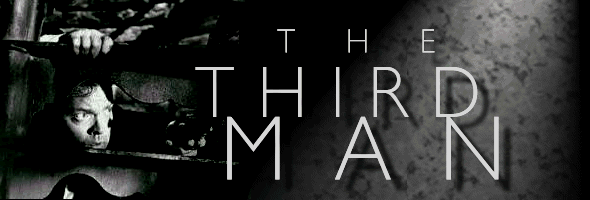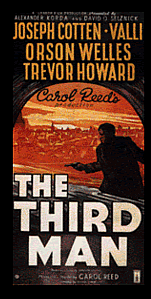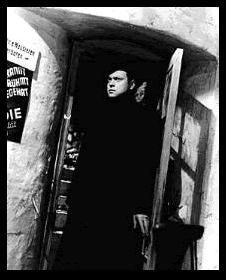
B&W, 1949, 104 mins. Directed by Carol Reed
Starring Joseph Cotten, Alida Valli, Orson Welles, Trevor Howard, Paul Horbiger, Ernst Deutsch, Bernard Lee, Wilfrid Hyde-White / Written by Graham Greene / Music by Anton Karas / Cinematography by Robert Krasker
Format: DVD - Criterion (MSRP $39.98)
Full Frame / Dolby Digital Mono
Aptly described by Peter Bogdonavich in his intro as perhaps the finest non-auteur film ever made, a "happy accident," The Third Man has remained steadily popular and critically revered since its release but has proven curiously impossible to imitate. Steeped in rich black and white cinematography, gorgeous shots of postwar Vienna, and a diverse cast operating at the top of its game, the film makes countless cinematic gambles along the way, all of which pay off in spades. Unfortunately, The Third Man fell into quasi-public domain status around the dawn of home video and has been smeared by numerous awful bootleg transfers, usually cut, which put quite a severe damper on a viewer's enjoyment of the film. However, Criterion's impressive new DVD following a successful theatrical reissue should quickly take its place as the definitive presentation of this stark, unforgettable noir classic.
Holly Martins (Joseph Cotten), an American novelist earning his keep with cheap western novels, travels to postwar Vienna to Though directed by the often overlooked Carol Reed, The Third Man has often been mistaken for an Orson Welles film thanks to the legendary actor/director's ten minute appearance as Lime. While the Welles influence can certainly be traced to the use of skewed angles and that old film school bugaboo, "deep focus," the film also falls squarely in line with Reed's elegant but cyncial portraits of humanity like The Fallen Idol. In fact, it's remarkable how much people tend to overlook the uncompromising bitterness and borderline nihilism of this film, thanks to its glossy European sheen and snappy, often amusing dialogue, easily Graham Greene at his best. In typical Greene fashion, moral absolutes are turned upside down, with betrayal often substituting for friendship and gray dominating as the moral color of choice. Criterion's DVD presents the complete European cut of The Third Man, featuring an opening voiceover by Reed as an unidentified black marketeer and a number of extra scenes which portray Holly in a less flattering light. The transfer simply looks spectacular; while a few unavoidable signs of age crop up here and there, mostly in the soundtrack, the presentation is by far the best this has looked since '49. The fragmented compositions and velvety chiaroscuro lighting seem to jump off the screen throughout, particularly during one pivotal scene an hour into the film; no distortion, grain, or noticeable damage is anywhere to be found. A number of extras make this pacakge even more tempting; rather than the usual commentary analysis track, the DVD features a radio presentation of the story with Cotten, Green's original treatment read by Richard Clarke, and an alternate radio drama with Welles reprising his character, far less effectively. Also included are the original (and utterly ridiculous) U.S. trailer, the 1999 reissue trailer, the U.S. opening sequence, documentary footage of Karas playing a number of standards on his zither, archival Vienna sewer footage, and production notes. Per Criterion's usual practice, the price may be a little steep, but no film fanatic should be able to pass this one up.
 accept a job offer through his friend, Harry Lime (Orson Welles). Upon arriving, however, Martins is informed that Lime has just been killed in a car accident, where his body was carted off by three men. Unsatisfied with the police's declaration of accidental death, Martins smells a rat and begins investigating what appear to be conflicting stories from witnesses and friends. Holly tracks down two of the three men and also becomes entangled with Lime's girlfriend, Anna Schmidt (Alida Valli). Apparently Lime was involved in the flourishing black market gradually overtaking Vienna, though the products Lime was dealing proved to be far more deadly than Holly had imagined.
accept a job offer through his friend, Harry Lime (Orson Welles). Upon arriving, however, Martins is informed that Lime has just been killed in a car accident, where his body was carted off by three men. Unsatisfied with the police's declaration of accidental death, Martins smells a rat and begins investigating what appear to be conflicting stories from witnesses and friends. Holly tracks down two of the three men and also becomes entangled with Lime's girlfriend, Anna Schmidt (Alida Valli). Apparently Lime was involved in the flourishing black market gradually overtaking Vienna, though the products Lime was dealing proved to be far more deadly than Holly had imagined.
 As far as surface pleasures, the catchy zither score by Anton Karas has become an institution in its own right; in fact, nowhere else has a single instrument become so completely identified with a film. Aside from the impish yet menacing turn by Welles, the cast also features a terrific role for Cotten as the deeply flawed Holly, a gorgeous Valli (also in Suspiria and The Paradine Case) as the possible femme fatale, and a number of current and future British actors like Trevor Howard, Bernard Lee (the first "M" in the James Bond series), and the great Wilfrid Hyde-White.
As far as surface pleasures, the catchy zither score by Anton Karas has become an institution in its own right; in fact, nowhere else has a single instrument become so completely identified with a film. Aside from the impish yet menacing turn by Welles, the cast also features a terrific role for Cotten as the deeply flawed Holly, a gorgeous Valli (also in Suspiria and The Paradine Case) as the possible femme fatale, and a number of current and future British actors like Trevor Howard, Bernard Lee (the first "M" in the James Bond series), and the great Wilfrid Hyde-White.
